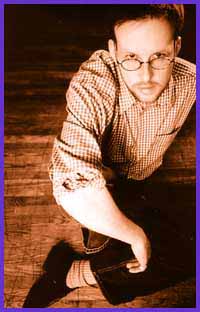In 1865, French novelist Emile Zola wrote the following cheery advice to his friend, the wealthy poet Anthony Valbregue: “If only you knew what a small part talent plays in success, you would drop pen and paper and begin to study the literary life, the cruelty needed to walk on the bellies of one’s dear confreres.”
Touching, and still bitterly true today – this is the unsolicited advice I offer shy, tender and outrageously talented Derek McCormack, the man too nice to be a star.
Not that McCormack needs my help. His first book of interlocked short stories, Dark Rides, earned him acclaim across the continent, culminating in McCormack making it to Detour magazine’s hot literary babes list.
And a beautifully made film version of McCormack’s story Stargaze (directed by his long-time roommate Jason McBride) just debuted at the Inside Out film festival, featuring the author himself in a pivotal cameo.
Dennis Cooper, Bruce LaBruce, Tony Burgess and Maya Angelou all proudly sport crepe and sequin “I Love Derek” ribbons at public functions. Well, okay, I lied about Maya, but you get the point.
In many ways, McCormack’s newest collection, Wish Book, is a sequel to Dark Rides, as it’s also set in mid-twentieth century, small-town Ontario. Wish Book is populated by unhappy, neurotic, or just plain dumb closet cases, freaks, horny kids and sexual predators – all of whom happen to share the writer’s own obsessions with carnival subculture, prestidigitation, dime store gimcrackery and buoyantly, joyously perverted sex.
Illustrated and designed by local genius Ian Phillips (of Pas De Chance publishing), Wish Book is this spring’s most delicious tome – more a box of dark, possibly poisonous chocolates than a mere short story collection.
Normally, just one of the above achievements – the fame, the talent, the good press – would send me into a hateful topspin of jealousy and rage, but I like McCormack; as I would anyone who admits that, before each reading he gives, he’s strung out on beta blockers.
McCormack’s my kind of people: twitchy, self-reliant, immune to hype and heavily sedated. In fact, I can’t find anyone to say two bad words about our famously bashful Derek.
“I asked someone which literary clique I belonged to, because I wasn’t sure,” McCormack typically demurs. “When I started out, I was the guy who went to every reading and just hoped for the best. I sort of feel like a writing fan. I’m still completely nervous meeting writers at parties whose work I like. I don’t know if I fit in or if I’m just a tag-along.”
New found celebrity aside, it ain’t all roses and tea cakes. McCormack was recently profiled in the Globe And Mail as the token fag in one of those reductive “generational” clusters of artists. (When will Canadian newspapers realize that “Brat Packs” are a US construct?) People are still twittering over his rather blunt and nasty assessment of Anne Michaels’s much adored novel, Fugitive Pieces.
McCormack is sanguine about the exposure, particularly all the brow beatings he took at his book store day job from scandalized Annex matrons who sleep with Fugitive Pieces under their Baycrests.
“People came in to the store and harangued me at work – which sounds funny, but when you’re at work you can’t say, ‘Fuck you.’ You have to say, ‘Would you like a bag with that?’
“People said I was un-Canadian and rude. I can be vulgar – but not rude, not confrontational. If you think I’m rude, wait till you read the book.
Now that we’re talking trash, I can’t help myself. I have to ask about the Timothy Findley incident. While reading at a London, Ontario Pride event last year, McCormack’s sex-friendly prose nearly got him hissed out of town. And the dowager empress of CanLit supposedly refused to shake his young colleague’s hand.
“Let’s just say he didn’t like me. He wasn’t very collegial.
“The pinnacle was being told by someone in the audience that I was sick, at which point I ran outside, stood on the sidewalk, and then some woman came out of the reading and screamed: ‘Get the fuck away from my car!’ So, that was London Pride.”
What would this country be without literary cat fights? Probably New Zealand. Never mind – McCormack’s press kit glitches are only speed bumps on the road to glory. Wish Book is the kind of dazzling work that makes people shut up and take notice.
With Dark Rides and now Wish Book – two works packed full of carny lore, con game science and vaudeville illusions (Wish Book is subtitled A Catalogue Of Stories) -McCormack has easily staked his claim for weirdest purveyor of arcane knowledge-driven fiction.
Where did he acquire all this information about long forgotten magic tricks and defunct novelty items? “I don’t know what or why things obsess me. I have so many obsessions, I can’t keep track.”
“I was one of those kids who used to do magic shows at old folks homes. I remember travelling with my parents to San Francisco, LA, Washington and digging through these dingy and dusty magic and novelty shops.
“Magic tricks seemed like an impenetrable world, a world you had to commit to 115 percent – sort of like being gay.”
McCormack’s prose style, sparse as Hanlan’s Point in January, is an ideal counterpoint to Wish Book’s lavish detail and circuitous narration. The longest sentence I counted was 17 words.
The effect of coupling such lean prose with lurid exotica is startling. Wish Book reads like an extended haiku – or a one-hander porn tract. The same exacting precision and careful choice of words that, happily, fuels both good poetry and good smut, charges Wish Book with a gleefully anal, jumpy and occasionally psychotic energy.
McCormack’s world is a ruthless la ronde set in Depression-era Peterborough where all the characters are on the take. Written in shocking telegraphs and brilliant, colourful swipes, Wish Book’s Ontario noire has more in common with James Ellroy’s staccato bulletins than the gooey romanticism of fellow neo-gothics Jane Urquart or Christine Baker.
“My main influence is Kathy Acker, because she dared to write badly, to show her thought processes on the page. I write badly a lot, and it’s easier to fix if the sentences are short and simple. When I started writing, I figured it was easier to build prose from small sentences, to build bigger effects.”
So where does a gay man more influenced by hard-boiled pulp, low-rent comix and other nasty mainstream trash turn to for, God help me, “community inspiration? ” After all, it’s not like McCormack is writing the kind of spousal-benefits-and-lawn-sprinklers gay fiction that made David Leavitt a millionaire.
McCormack sees his place in the gay cannon as being more idiosyncratic than exemplary. “When Dark Rides came out, I was asked a number of times if I minded being labelled a gay writer. I always said no. When I think of gay writing I think of a series of great, solitary, obsessive writers – Gertrude Stein, the critic Guy Davenport, Marcel Proust.
“There’s a good argument that gay culture is great because it’s made up of these loners who are deliberately minor. I mean minor not in importance, but in the practice of deliberately working outside of the majority, on their own.
“I like art that creeps slowly – like lichen – and is vital. I hate Olympian, lofty art. It makes me sleepy.”
Wish Book.
By Derek McCormack.
Gutter Press.
171 pages. $15.95.
Derek McCormack gives a reading with Sarah Sheard and Justice Ward as part of the Harbourfront Reading Series at 8pm on Fri, Jun 11; tix cost $8. Then Harbourfront celebrates the series’ 25th anniversary at 8pm on Sat, Jun 12 with Timothy Findley, Anne Michaels, Tomson Highway and a total of 25 authors who’ll each provide a reminiscence about a memorable encounter with another writer; tix are $35. Call (416) 973-4000.


 Why you can trust Xtra
Why you can trust Xtra


